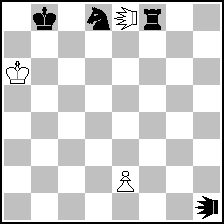
Website founded by
Milan Velimirović
in 2006
19:42 UTC


| |
MatPlus.Net  Forum Forum  Promenade Promenade  The DeLorean The DeLorean |
| |
|
|
|
|
You can only view this page!
| | | (1) Posted by Hauke Reddmann [Tuesday, Aug 20, 2019 21:24] | The DeLorean
Fairy chess has this and that, but I don't recall a piece
that can move through time. But how shall the DeLorean move?
I have no idea, since you run into the usual time paradoxes.
I see two main possibilities:
a) Parallel universes. The time travel creates a new timeline.
Well, slap me with a trout, but haven't we exactly that
with retro variation problems?
b) A stable time loop. Now that reminds me of a posteriori logic...
Feel free to expand, I'm a 2# expert :-)
| | | (2) Posted by Rosie Fay [Wednesday, Aug 21, 2019 08:12] |
"Parallel universes. [..Don't we have] exactly that with retro variation problems?"
Hm, perhaps, but if this counts as parallel universes, then so does try-play and actual play (in one universe White played 1. T?; in another, White played 1. K!) and so does branching in the solution-tree.
One chess phenomenon which for me looks more like bending Time's straight arrow is when the side to move captures a pawn en passant with no proof that that is legal, and later castles to prove the en passant capture legal.
| | | (3) Posted by Dmitri Turevski [Wednesday, Aug 21, 2019 08:46]; edited by Dmitri Turevski [19-08-21] |
Alex Levit has had exactly the same idea with the stable time loops (although he called the piece "The Terminator", not "DeLorean", still close) and has composed a clever h#2 with a terminator pawn that arrives from future as a promoted piece so original has to promote and then travel back in time to close the loop:
https://alex-levit.livejournal.com/1023.html
| | | (4) Posted by Hauke Reddmann [Wednesday, Aug 21, 2019 10:28] |
@Rosie: Yes, exactly this I was thinking.
QDimitri: There is nothing new under the sun :-)
Here is how I thought how a new timeline would work:
 (= 2+4 ) (= 2+4 )
DeLorean h1 (moves only in time), series# in 5
Solution: 1.e4...5.exf8Q 6.Qxd8 takes one move too long.
Thus: 1.e4...5.e8DL! (now moves back in time so that
the new timeline is this diagram - already at move 1!
 (= 3+4 ) (= 3+4 )
And now 1.e4...5.exd8Q#.
Please be careful when crossing zebra walks :-)
Hauke
| | | (5) Posted by Dmitri Turevski [Wednesday, Aug 21, 2019 13:22] |
So the stipulation should be series checkmate in at least one timeline :)
And 5.exf8=DL doesn't work because you cannot time-travel to a square occupied in the past?
Tangentially related, the computational complexity in closed timelike curves is a thing! There are papers, this one doesn't even require the mathematical background from the reader (sort of):
www.scottaaronson.com/papers/philos.pdf
| |
No more posts |
MatPlus.Net  Forum Forum  Promenade Promenade  The DeLorean The DeLorean |
|
|
|
 ISC 2024
ISC 2024 Forum
Forum  Promenade
Promenade  The DeLorean
The DeLorean 


